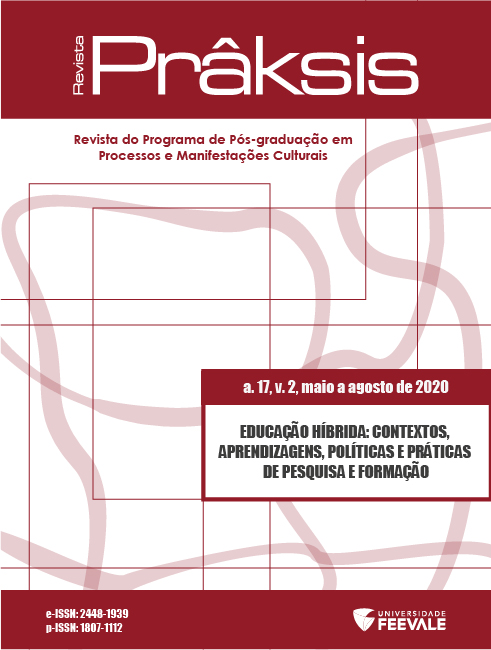ENSINO HÍBRIDO E O DESENVOLVIMENTO DE COMPETÊNCIAS GERAIS DA BASE NACIONAL COMUM CURRICULAR
DOI:
https://doi.org/10.25112/rpr.v2i0.2208Abstract
RESUMO
A Base Nacional Comum Curricular (BNCC) é a referência de todas as instituições escolares para a formulação de seus currículos e propõe, juntamente com o desenvolvimento intelectual e cognitivo dos estudantes, o desenvolvimento de algumas competências gerais, dentre elas as habilidades de comunicação, argumentação, empatia e cooperação, assim como a compreensão de uma educação para a cultura digital e a curiosidade científica. Neste sentido, este artigo tem por objetivo relacionar o Ensino Híbrido como um possível modelo de aula que pode contribuir com o desenvolvimento dessas competências gerais, pois possui momentos de aprendizagem que podem ser coletivos ou individuais e ainda possibilita o uso de tecnologias digitais. Este é um relato de experiência que tem por finalidade mostrar a prática docente aliada a uma teoria que embasa cada decisão de planejamento, execução e reflexão pós-prática para a elaboração de aulas que atendam ao que é proposto na BNCC. Os resultados dessa experiência prática evidenciam que a intencionalidade do professor ao preparar cada experiência de aprendizagem oferecida aos estudantes pode impactar no desenvolvimento das competências gerais propostas pela BNCC, fazendo-se necessário repensar a prática docente.
Palavras-chave: Ensino Híbrido. Base Nacional Comum Curricular. Competências.
ABSTRACT
The National Common Curricular Base (NCCB) is the reference of all educational institutions for the formulation of their curricula and proposes, together with the students' intellectual and cognitive development, the development of some general skills, among them, communication, argumentation, empathy and cooperation skills, as well as understanding education for digital culture and scientific curiosity. In this sense, this paper aims to relate Blended Learning as a possible model of class that can contribute to the development of these general competencies, as it has moments of learning, which can be collective or individual and also allows the use of digital technologies. This is an experience report that aims to show the teaching practice combined with a theory that supports each decision of planning, execution and post-practice reflection for the preparation of classes that meet what is proposed in the NCCB. The results of this practical experience show that the teacher's intentionality in preparing each learning experience offered to students can impact the development of the general skills proposed by NCCB, making it necessary to rethink the teaching practice.
Keywords: Blended Learning. National Common Curricular Base. Skills.
Published
How to Cite
Issue
Section
License
• Os autores mantêm os direitos autorais e concedem à revista o direito de primeira publicação com o trabalho licenciado sob a Licença Creative Commons - Attribution 4.0 International (CC BY 4.0).
• Os autores são estimulados a publicar e distribuir seu trabalho online (ex.: em repositórios institucionais ou na sua página pessoal), pois isso pode aumentar o impacto e a citação do trabalho publicado.


